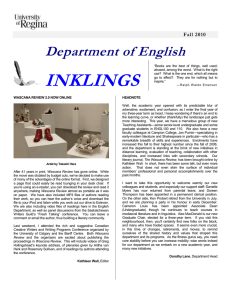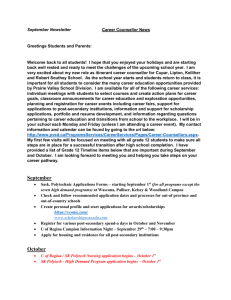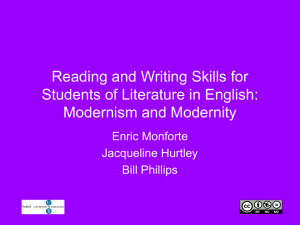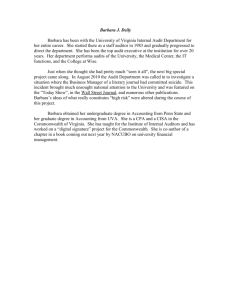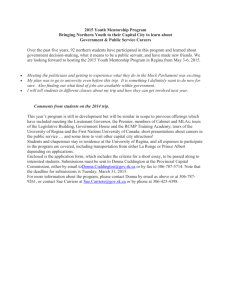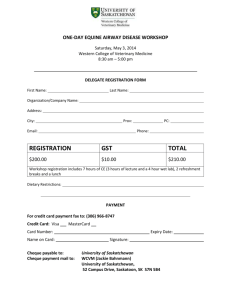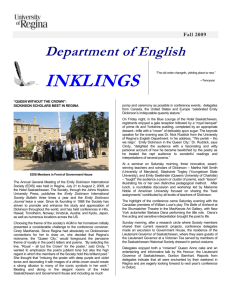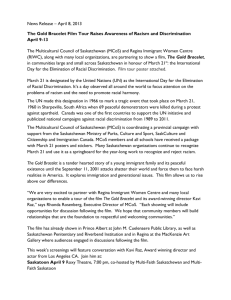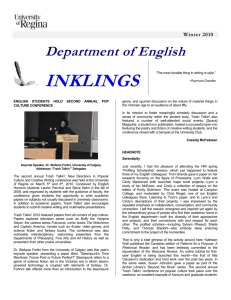Fall 2002 - University of Regina
advertisement
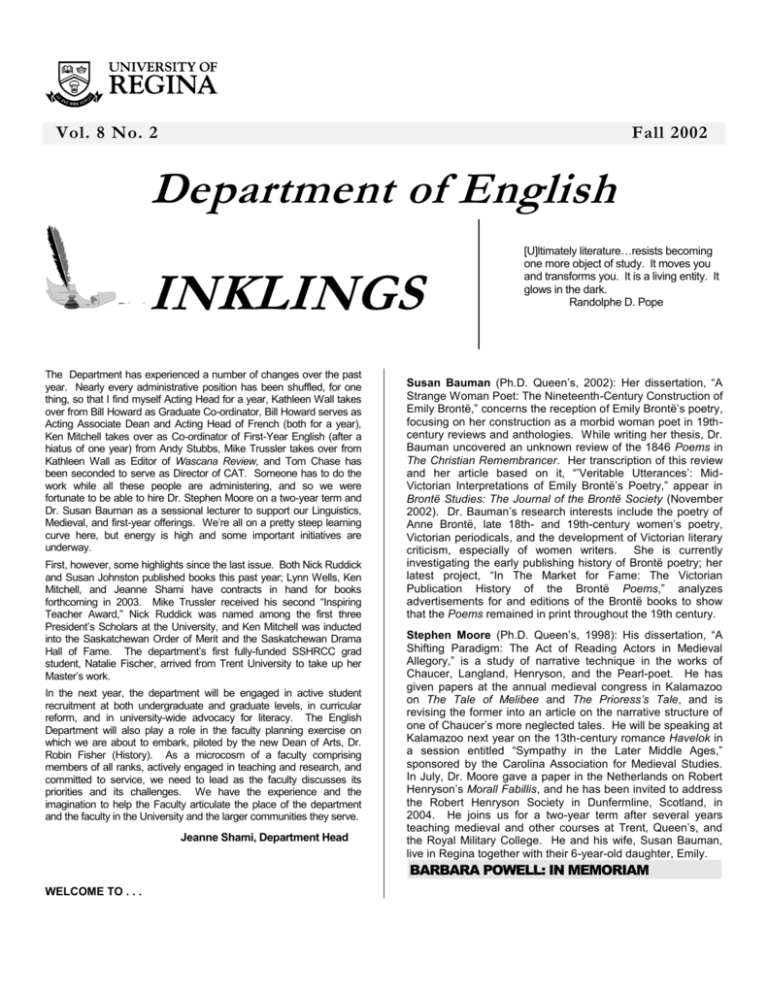
Vol. 8 No. 2 Fall 2002 Department of English INKLINGS The Department has experienced a number of changes over the past year. Nearly every administrative position has been shuffled, for one thing, so that I find myself Acting Head for a year, Kathleen Wall takes over from Bill Howard as Graduate Co-ordinator, Bill Howard serves as Acting Associate Dean and Acting Head of French (both for a year), Ken Mitchell takes over as Co-ordinator of First-Year English (after a hiatus of one year) from Andy Stubbs, Mike Trussler takes over from Kathleen Wall as Editor of Wascana Review, and Tom Chase has been seconded to serve as Director of CAT. Someone has to do the work while all these people are administering, and so we were fortunate to be able to hire Dr. Stephen Moore on a two-year term and Dr. Susan Bauman as a sessional lecturer to support our Linguistics, Medieval, and first-year offerings. We’re all on a pretty steep learning curve here, but energy is high and some important initiatives are underway. First, however, some highlights since the last issue. Both Nick Ruddick and Susan Johnston published books this past year; Lynn Wells, Ken Mitchell, and Jeanne Shami have contracts in hand for books forthcoming in 2003. Mike Trussler received his second “Inspiring Teacher Award,” Nick Ruddick was named among the first three President’s Scholars at the University, and Ken Mitchell was inducted into the Saskatchewan Order of Merit and the Saskatchewan Drama Hall of Fame. The department’s first fully-funded SSHRCC grad student, Natalie Fischer, arrived from Trent University to take up her Master’s work. In the next year, the department will be engaged in active student recruitment at both undergraduate and graduate levels, in curricular reform, and in university-wide advocacy for literacy. The English Department will also play a role in the faculty planning exercise on which we are about to embark, piloted by the new Dean of Arts, Dr. Robin Fisher (History). As a microcosm of a faculty comprising members of all ranks, actively engaged in teaching and research, and committed to service, we need to lead as the faculty discusses its priorities and its challenges. We have the experience and the imagination to help the Faculty articulate the place of the department and the faculty in the University and the larger communities they serve. Jeanne Shami, Department Head [U]ltimately literature…resists becoming one more object of study. It moves you and transforms you. It is a living entity. It glows in the dark. Randolphe D. Pope Susan Bauman (Ph.D. Queen’s, 2002): Her dissertation, “A Strange Woman Poet: The Nineteenth-Century Construction of Emily Brontë,” concerns the reception of Emily Brontë’s poetry, focusing on her construction as a morbid woman poet in 19thcentury reviews and anthologies. While writing her thesis, Dr. Bauman uncovered an unknown review of the 1846 Poems in The Christian Remembrancer. Her transcription of this review and her article based on it, “’Veritable Utterances’: MidVictorian Interpretations of Emily Brontë’s Poetry,” appear in Brontë Studies: The Journal of the Brontë Society (November 2002). Dr. Bauman’s research interests include the poetry of Anne Brontë, late 18th- and 19th-century women’s poetry, Victorian periodicals, and the development of Victorian literary criticism, especially of women writers. She is currently investigating the early publishing history of Brontë poetry; her latest project, “In The Market for Fame: The Victorian Publication History of the Brontë Poems,” analyzes advertisements for and editions of the Brontë books to show that the Poems remained in print throughout the 19th century. Stephen Moore (Ph.D. Queen’s, 1998): His dissertation, “A Shifting Paradigm: The Act of Reading Actors in Medieval Allegory,” is a study of narrative technique in the works of Chaucer, Langland, Henryson, and the Pearl-poet. He has given papers at the annual medieval congress in Kalamazoo on The Tale of Melibee and The Prioress’s Tale, and is revising the former into an article on the narrative structure of one of Chaucer’s more neglected tales. He will be speaking at Kalamazoo next year on the 13th-century romance Havelok in a session entitled “Sympathy in the Later Middle Ages,” sponsored by the Carolina Association for Medieval Studies. In July, Dr. Moore gave a paper in the Netherlands on Robert Henryson’s Morall Fabillis, and he has been invited to address the Robert Henryson Society in Dunfermline, Scotland, in 2004. He joins us for a two-year term after several years teaching medieval and other courses at Trent, Queen’s, and the Royal Military College. He and his wife, Susan Bauman, live in Regina together with their 6-year-old daughter, Emily. BARBARA POWELL: IN MEMORIAM WELCOME TO . . . INKLINGS Fall 2002 The University of Regina lost a valued colleague and friend with the death of Barbara Powell, May 21, 2002. Barbara’s association with the University was long standing. Over 17 years, she taught classes in linguistics and Canadian literature for the English Department, where she was awarded an Inspiring Teacher Award. Later, she served as Coordinator of the Women’s Studies Program. On a half-time position, at first, and with limited resources, Barbara worked full time to build, develop, and nurture a program that today serves many needs and draws upon the expertise and cooperation of many places on campus. She planned the Women’s Studies major, developed the foundational Women’s Studies 100 class (and taught it herself), developed distance education classes in Women’s Studies, counselled many students, supervised and examined theses, and lobbied for greater recognition of and support for the program. Ultimately, as Associate Dean of Arts, Barbara continued her association with the Women’s Studies program and handled her new duties with imagination, with competence, and with sensitivity to the people with whom and for whom she worked.. Her interest in women’s words and undocumented stories continued to inspire her research and publications (much of it collaborative) regarding women in Saskatchewan, diaries, postcards, and communities. Barbara was very good at her administrative work – just as she was a memorable and effective teacher, and a serious scholar. We remember, too, Barbara’s love of music, particularly her role as fiddler with the local bands Celtic Clutter and Outlanders. Always committed to excellence, Barbara turned this passion into excellent fun and a source of joy for herself and her family and friends. Barbara enjoyed many gifts in her life – family, friends, work she loved, good food, travel. But more important, she dispensed many gifts. She was a good listener – a wise listener, even – and didn’t tolerate careless answers to profound questions. And although she certainly knew how to have fun, she was an intellectual, and thought deeply about things. She taught many of us who were close to her what it is to confront fears and to embrace them. In the last few months, Barb and I talked a lot about her journey towards death through the perspective of someone whose skill with language and whose faith surpassed both of ours – but whom we both admired: John Donne. Donne believed that “God will speak unto me, in that voice, and in that way, which I am most delighted with, and hearken most to. If I be covetous, God will tell me that heaven is a pearle, a treasure. If cheerfull and affected with mirth, that heaven is all Joy. . . If sociable, and conversable, that it is a communion of saints.” Most of you will probably have heard the famous passage from Donne’s Devotions in which his own illness leads him to say that “No man is an island.” That metaphor of the community of spirit that binds all human beings to one another was powerful: “Any Mans death diminishes me because I am involved in Mankinde.” But, that metaphor was not nearly so meaningful to Barbara as the one that took its impetus from something she delighted in most – books. “All mankinde,” Donne says “is of one Author, and is one volume; when one Man dies, one Chapter is not torne out of the booke, but translated into a better language; and every Chapter must be so translated; God employs several translators; some peeces are translated by Age, some by sicknesse, some by warre, some by justice; but Gods hand is in every translation; and his hand shall bind up all our scattered leaves againe, for that Librarie where every booke shall lie open to one another.” Page 2 People have imagined heaven – or a world of the spirit – as many things, but both Barbara and I took comfort in the idea of heaven as a library, where the communion of souls would be as open, as engaging, and as meaningful as a book wellconceived, well-written, and, finally well-translated so that those outside her circle could read and know her too. Barbara is missed here by those who were literate in her “language,” by her husband David, her children Alison, Eric, and Nathan, her extended family, many students, colleagues and friends. Jeanne Shami WASCANA REVIEW As the new general editor of Wascana Review, Michael Trussler would like to thank the journal's previous editor, Kathleen Wall, for the enormous amount of work she put into the magazine. Wascana Review published a Special Issue, The Twentieth Century, for a conference hosted by the University of Regina on November 22-23 called "Contexts: Scholarly Communication Today." This issue features Linda Hutcheon, Mark Kingwell, F.C. DeCoste, Michael Zeitlin, Russell Brown, Thomas Carmichael, Brad Bucknell, Janette Turner Hospital, Britt Holmstrom and Brenda Baker--truly a collector's item. Topics such as the death of postmodernism, the reign of film, the philosophical implications of identity politics and personal responses to the past century make this issue especially exciting. Copies of this issue can be ordered by e-mailing Michael Trussler (Michael.Trussler@uregina.ca); the cost is $7. For a regular subscription, please contact Bette Fiege (Department of English, University of Regina, Regina, SK); orders should be accompanied by a cheque. The cost to Canadian subscribers is $10/year; to all others, $12/year. VISITING SPEAKERS Dr. David Solway, Professor Emeritus of John Abbott College in Montreal, is a renowned poet, playwright and critic, whose recent books include Random Walks: Essays in Selective Criticism and The Lover's Progess: Poems After William Hogarth." On Thursday, Nov. 21 at 3:00 p.m. in the University Club, Dr. Solway gave a talk entitled "Poetic Influence and Poetic Craft: A Personal Account" to the English Department. The next day, he delivered a second lecture, sponsored by the Teaching Development Center, at 3:00 p.m. in the Riffel Auditorium, Campion College, entitled "Reading, Riting and Rhythmitic: the Fate of Reading in a Technological Age." He also appeared in events at the Mackenzie Art Gallery on the Friday and Saturday evenings. For more information, contact Lynn Wells (Lynn.Wells@uregina.ca). Dr. Barbara Powell Humanities Research Institute Visiting Lecturer Series featured Dr. Marjorie Garber of Harvard University. It was held in the University Theatre in the Riddell Centre, November 23rd, at 1:15 p.m. ORLENE MURAD ACADEMIC DISCUSSION SERIES Sandy Bingaman and Florence Stratton INKLINGS Fall 2002 In the English department, we have extra reason to celebrate Fridays because they often include OMAD presentations. So far this semester, we have descended to "Bluebeard's Chamber" guided by Nick Ruddick, enjoyed Emily Dickinson's "Tactile Poetics" read and explained by Cindy Mackenzie, and visited Nicole Brossard's "Mauve Desert" with Nicole Côté. The final speaker this semester will be Gail Bowen who will read from The Glass Coffin on November 29. After Christmas, we again hope to have four OMADs, so mark the following dates on your calendars: January 17 February 7 March 7 March 28 Stephen Moore Chris Riegal Student presentation Panel on Holocaust Studies. All events are scheduled for Ad-Hum 348 from 3:30 to 4:30 p.m. and are followed by a reception in the third floor lounge. As usual, we need volunteers to bring food for each of these events, so please speak to Florence or Sandy if you can help out. Many thanks to Troni Grande, Rick Harvey, and Susan Johnston who fed us so well this semester. Page 3 (Trent), Chris Gbekorbu-Matters (U of R), Tyler Hooker (U of r), Samantha Jackson (UPEI), Marcy Koethler (U of R), Ben Laskar (U of T), Justin Messner (U of R), Tara Seel (U of R), and Helen Sinar (Leeds). M.A. THESIS NEWS Stephen Bonn graduated in May 2002. His thesis was entitled "An Examination of the Poetic Metaphors and Similes in Three Travel Books by Paul Theroux: The Great Railway Bazaar, The Kingdom by the Sea, and The Happy Isles of Oceania." Supervised by Nicholas Ruddick. Dianne B. Shannon graduated in spring 2002; her thesis was entitled “Daughters Without Mothers in the Girl Quest Tale.” Supervised by Barbara Powell and Troni Grande. Fiona Vance graduated in spring 2002 with a thesis entitled "'And it Struck Me that I Should Listen': Madness in Timothy Findley's 1990s Fiction." Supervised by Ken Probert. Shawna Geissler convocated in the fall of 2002 with a thesis entitled “The Use of Apocalyptic Elements in Contemporary British Fiction.” Supervised by Lynn Wells. STUDENT NEWS & NOTES Tracy Hamon, a third year English major, has a poem, “picture show,” forthcoming in Grain (November 2002). A second poem, “buried stone,” is forthcoming in A Room of One’s Own. Tyler Hopson, a 4th year English major, has recently been named Arts and Entertainment editor at the Carillon for the 2002-03 school year. He is also a student writer for the Students Promoting Awareness about Research Knowledge (SPARK) program, officiated by the University. Articles for this program appear in university related publications as well as the Leader-Post. Joanna Mansbridge (Honours) has been awarded a Torville Honours Scholarship and the Ratner Prize. Elise Moore (Honours) has been awarded the L.G. Crossman Scholarship. Kathryn Nogue (Honours) has been awarded a Torville Honours Scholarship GRADUATE NEWS Darcy Kirkham has been granted a Graduate Student Scholarly Research Award. Marcy Koethler has been awarded the Lucy Murray Scholarship, granted to the student entering the graduate program with the highest undergraduate average. She also holds a Graduate Student Scholarly Research Award. Robin Markel received a $500 Graduate Studies Travel Grant to present a paper entitled “Jokes are 'Telling': Jokes as Subtext in Alice Munro's 'Floating Bridge' “ at the 7th International Conference on the Short Story in English (New Orleans, July 11-14, 2002). She also holds a Graduate Student Scholarly Research Award. The Department welcomes 11 new graduate students this year: Jennifer Arends (U of R), J.J. Elliott (U of R), Natalie Fischer NEWS OF DEPARTMENT MEMBERS Nils Clausson published “The Case of the Purloined Genre: Breaking the Codes in Susan Glaspell’s ‘A Jury of Her Peers’” in Genre (Spring-Summer 2002): 81 – 100. Last spring he directed Regina Little Theatre’s production of The Scarborough Four, and his poem “A Formalist’s Complaint” recently appeared in Real: The Journal of Liberal Arts (Spring/Fall 2002): 67. Jo-Ann Episkenew and Renate Eigenbrod (Acadia University) edited Creating Community: A Roundtable on Canadian Aboriginal Literature, a collection of essays co-published by Bearpaw (U of Brandon) and Theytus Presses, which was launched at the CACLALS Conference on May 25th at the Congress of Social Sciences and Humanities. Jean Hillabold has recently published “The Nicotine Wars: Clearing the Air in Lesbian Space” in Girlfriends (Oct. 2002): 3032, 43 as well as a number of short fictions: “Focal Point” in Prometheus 40 (2002); “Communion,” in Shameless, ed. Hanne Blank (Seattle: Seal Press, 2002); “A Dowager’s Hump” in Ripe Fruit, ed. Marcy Sheiner (Cleis Press, 2002); and “Opening Ceremony” in Desires, ed. Adrienne Benedicks (New York: Venus Book Club, 2002). Heather Hodgson edited The Great Gift of Tears which contains four plays by three First Nation playwrights: Floyd Favel and Deanne Kasokeo (both of Poundmaker) and Bruce Sinclair (Waterhen). The collection was published by Coteau Books in October, 2002, and is available in the University of Regina Bookstore under “University Authors.” Susan Johnston has been granted tenure and promoted to Associate Professor. Cameron Louis has published "Male Competition and Misogyny in Two Interludes by John Heywood," Journal of Gender Studies 11 (2002): 129-39. Cindy MacKenzie attended the annual meeting of the Emily Dickinson International Society in Amherst, Massachusetts in July. The meeting featured discussions by composers about the INKLINGS Fall 2002 process of setting Dickinson’s verse to music as well as numerous musical presentations of Dickinson’s poetry culminating in a splendid concert of six sopranos in Grace Episcopal Church. Her collection of “Vintage Forms and Fabrics” featuring lavender-filled Victorian sachets were acquired by the curator of the Dickinson Homestead where they are now on sale in the gift shop. In addition, Cindy is working on a book, “I Dwell in Possibility:” Dickinson’s House of Language for which she has a preliminary contract with Kent State University Press. She presented a paper based on that project at the Murad Lecture Series in October titled “’Syllables of Velvet, Sentences of Plush’: Dickinson’s Tactile Poetics.” This year, she will attend and give papers at the Learneds in Halifax and the American Literature Association in Cambridge, Massachuetts. She also reviews books regularly for Books in Canada, ranging from new works on Emily Dickinson to the short stories of Richard Ford and, in the upcoming edition, a detective novel by Canadian model and author Tara Moss. In addition, as councillor of the Resort Village of Katepwa Beach, Dr. MacKenzie set up recreational programs for youth and invited Saskatchewan author Trevor Herriot to read in the park from his book, River in a Dry Land, as well as to discuss environmental concerns in the Valley. Astronomer Peter Bergbusch from the U of R also volunteered to come to Katepwa to set up telescopes in the hills for some lessons on stargazing in August. Ken Mitchell’s adaptation of Sarah Binks, Paul Hiebert's great biography of the Sweet Songstress of Saskatchewan, was produced at the Saskatoon Fringe Festival in August, selected for a "Best of the Fringe" presentation at the University of Saskatchewan in September, and recorded by CBC Radio in October for broadcast on Gallery Dec. 14 and 15. Admirers of Sarah's poetry (put to music by former English student Doug Hicton) should tune in. His stage adaptation of “The Great Electrical Revolution" ran at the Mayfield Dinner Theatre in Edmonton from Sept. 13 to November 3. In June, Professor Mitchell was appointed Co-ordinator of First Year English. Nick Ruddick published an article, “The Ripper Naturalized : Gynecidal Mania in Tolstoy’s The Kreutzer Sonata and Zola’s La Bête Humaine” in Excavatio: International Review for Multidisciplinary Approaches and Comparative Studies Related to Emile Zola and His Time, 14.1-2 (2001): 181-93. He also published a piece on Philip Larkin’s poem “Aubade” in the reference work Masterplots II: Poetry Series, revised edition, ed. Philip K. Jason. Pasadena: Salem P, 2002. 273-75. He presented a paper, “Ignatius Donnelly’s Caesar’s Column (1890): A Forgotten Classic of American Science Fiction” at SFRA 2002: The Annual Conference of the Science Fiction Research Association, New Lanark, Scotland, 28 June-1 July 2002. He gave a paper, “Another Key to Bluebeard’s Chamber: Ideal and Fundamentalist Masculinity in the Literature of Fantasy,” in the Orlene Murad Academic Discussion Series, University of Regina, 20 September 2002. He was given a one-course teaching release award by the new Humanities Research Institute at the University of Regina in Fall 2002 to complete his edition of The Woman Who Did by Grant Allen. In July 2002 , Professor Ruddick was chosen as one of the first three University of Regina President’s Scholars. Florence Stratton’s article, "Imperial Fictions: Coetzee's Disgrace" has recently been accepted for publication by ARIEL. Michael Trussler's story "Angels" was published by The Harpweaver in its Spring 2002 issue. Trussler attended the 7th International Conference on the Short Story in English, held in New Orleans in July: he delivered a paper entitled "Literature and Philosophy: Thom Jones's Use of Schopenhauer," participated on Page 4 a panel devoted to writers who publish both scholarly and creative writing, and read "Angels" at a public reading. Christine Watson presented “Facing the Challenge: Narratives of Trauma and Aboriginal Post-Secondary Education" at the Narratives of Trauma, Disease and Disability Conference in Vancouver (May 8-12) jointly with Robert Procyk, (SIFC English, Prince Albert campus). She also presented "Memory Work in Language Arts Education" at the Saskatchewan Aboriginal Literacy Conference (May 12-14). ALUMNOTES Greg Burbidge (B.A. 2000) is working on a Master’s degree in Arts and Religion at the Canadian Theological Seminary and working full-time as an exchange manager with the Saskatchewan Cultural Exchange. Michael Fisher (B.A. 1998) has returned from a teaching tour in South America and taken up a position with the Metis Nations of Saskatchewan. Stephen King (M.A. 1997) has recently published “Your Loving Son”: Letters of an RCAF Navigator (Canadian Plains Research Centre, 2002). Lynn Goldman (M.A. 1980) has been presented with a Golden Jubilee Medal in a ceremony at Rideau Hall, Ottawa. The medal was created to honour Canadians who have made a significant contribution to Canada; Lynn Goldman was honoured for her work with the Canadian Club of Regina, the Regina Women’s Network, the Saskatchewan Arts Board, Regina Little Theatre, and other organizations too numerous to mention. Nolan Whyte (B.A. 2001) has recently returned from a one-year tour teaching English as a foreign language in Busan, South Korea (formerly Pusan). News to be included in the next issue of Inklings is due March 1, 2003. PLEASE FORWARD YOUR NEWS TO: Susan Johnston, Editor, Inklings Department of English University of Regina Regina, Saskatchewan S4S 0A2 Canada
